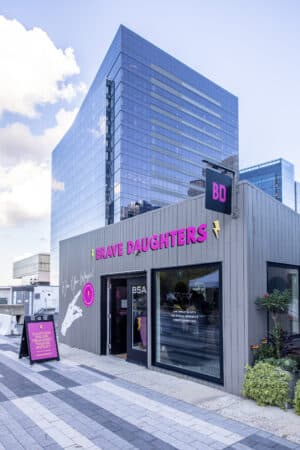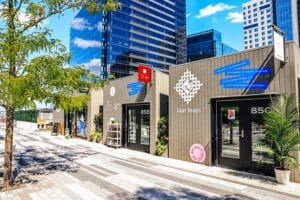
Brave Daughters jewelry graduated from a short-term pop-up store to a permanent location at WS Development’s Superette last fall. Photo courtesy of Brave Daughters
In what’s becoming a commonly accepted practice, retail landlords such as WS Development and Wilder regularly take a flier on local, independently-owned shops that bring unique, new concepts to their portfolios in places like Boston Seaport and Watertown’s Arsenal Yards.
“It allows us and a brand to get to know each other, like being on a first date,” said Carina Donoso, WS Development’s vice president of retail experience and incubation. “If it all works out, you get married.”
One-time pop-up vendors such as Injeanius and Brave Daughters jewelry marched down the aisle with WS by signing leases for permanent spaces after successful trial runs at The Current, WS’s incubator space in the Boston Seaport.
The pop-up model breaks down barriers for retail startups that don’t have the experience and finances to commit to a long-term lease and costly store buildout. Ordinarily, these companies are at a disadvantage to national chains, with their strong balance sheets and credit histories, when it comes to securing retail space in new developments.
The alternative path to brick-and-mortar occupancy involves retailers signing licensing agreements for as little as three months. Amid tectonic shifts in the retail landscape, short-term real estate relationships have become more central to property owners’ strategies.

Short-term deals with independent retail startups are becoming more central to landlords’ merchandising strategies. At The Current in Boston’s Seaport District, tenants without the finances or experiences to commit to a long-term lease get to introduce themselves to landlord WS Development. Photo courtesy of WS Development
Arsenal Yards Covets Local Operators
Developer Wilder is embracing the pop-up strategy at its Arsenal Yards property in Watertown, including the transition of women’s clothing boutique Too Tempted into a new, permanent storefront.
Wilder introduced pop-ups in 2020 to promote fresh brands and incubate potential long-term tenants that don’t have funds for a traditional agreement, Wilder Principal Tom Wilder said in a statement. Typical agreements run for six months.
“If it’s a local operator that has demonstrated success, then we welcome the opportunity to make a long-term deal,” Wilder said.
Even before COVID, Newton-based WS Development saw an opportunity to experiment with a non-traditional merchandising mix at its 33-acre Seaport portfolio.
After filling ground-floor storefronts in new Seaport office and residential towers, WS Development pioneered a quirky assemblage of independent shops in a cluster of cabin-like storefronts called The Current along Seaport Boulevard. The first version in 2018 included women-owned brands, while the 2022 season brought the arrival of nine Black-owned shops.
Unlike a traditional lease, in which tenants pay a percentage of utility and maintenance costs, such payments are structured as a recurring monthly charge.
‘We Can Meet Retailers Halfway’
Beyond predictable costs, WS provides support on design and permitting to maximize speed to occupancy, Donoso said.
“There’s a handful of brands that don’t have the capital to buy all-new fixtures, but they have capital to invest in inventory. We can meet them halfway,” she said.
More than 80 brands have cycled through The Current in recent years or have had their runs extended beyond their original term. Successful graduates such as workout gear vendor Booty by Brabants used The Current as a launching pad to sign permanent leases with WS at Legacy Place in Dedham and MarketStreet Lynnfield.
Another, jewelry vendor Brave Daughter, opened a pop-up in May 2022 at The Current and will move into a permanent space this October at The Superette, WS’s 125,000-square-foot retail village at 131 Seaport Blvd.

Steve Adams
A chance visit by a WS employee to Brave Daughters’ Providence store started discussions on a location in Boston, founder Erin Myles said. The Current location will remain open through an extension granted by WS Development until the Superette storefront is ready for occupancy, Myles said.
“It’s allowed us to test the market without a lot of risk, which is nice,” she said.
Alison Barnard O’Brien, founder of the injeanius denim boutique, pivoted to The Current after losing a lease at her North End storefront. After the shop’s strong performance, WS offered O’Brien a five-year lease for a 1,100-square-foot location at the Superette that opened in November.
“The Current was a perfect opportunity to try a neighborhood and see if it was a good platform for the store,” O’Brien said. “Is it the next big thing, or did it buy me some time before finding my next permanent location?”




 |
| 
